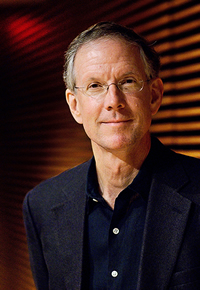Filed Under > TC Community
The Case for Pondering
TC's David Hansen argues for education that questions as much as it defines
Philosophy often uses apparently simple questions to jolt us to search for deeper meaning. In that tradition, David Hansen opened his recent inaugural lecture as TC’s John L. & Sue Ann Weinberg Professor in Historical and Philosophical Foundations of Education by asking, “Is education possible today?”
In a talk that touched on Nietzsche, Descartes, Emerson, Schubert, Du Bois and the Upanishads, Hansen said that educators should worry less about coming up with an actual answer than about staying mindful of the question – or, as he put it, about “holding it close” and “feeling its presence as fully as possible.”
Hansen evoked Rainer Maria Rilke, who urged young poets to “have patience with everything unresolved in your heart.” By similarly welcoming the ambiguities and dilemmas inherent in their work, Hansen said, educators can navigate between the pressures of professionalization and the need to “holistically cultivate human beings in company of other human beings.”
Hansen believes that society today tends to reduce education to socialization. That function has value -- “We do need what it pours into us; we all need instruction and training,” he said, but this way of thinking is clearly not sufficient.
“I take education to mean, in part, discovering the primordial cultural fact that things are often taken as given,” he said. “This discovery involves a further one: that you yourself, as human being, are not given, in manner of an acorn or an egg. You can participate in writing your own script.”
Today, Hansen said, “teachers from pre-school to graduate school find their sense of beautiful openness conflicts with what the system will support.” He cautioned against the path of least resistance. “It’s far easier to just keep making decisions or keep enacting pedagogy that screens out the questions,” he said. “I think it would be a personal and societal loss to take the easier route. To pose the question, and to stay near it, is to accept an invitation to philosophy – to think openly about what we mean by concepts of truth, justice, and education.”
Educators constantly have to make choices, Hansen said. Because the option of not educating is unacceptable, everyone in the field is always “enacting a working answer” to the question of education’s possibility. Every choice occurs within constraints and engenders “qualms.” For Hansen, accepting that there is no single answer is not only a survival technique but honors the very philosophical basis of education.
“For teachers who have discovered how natural philosophical questions can be,” he said, “dwelling with tensions between one’s actions and aims, concerns, and hopes, is simply part of the job.”
Although audience members who asked questions after the talk welcomed Hansen’s perspective – “I feel like I’ve been to church, and I haven’t been in a long time,” one woman said – they also raised practical concerns. Several questioners pointed out that Hansen’s vision of education needs time and today the emphasis is on speed. One asked how to find the language to explain and justify this thoughtful perspective when faced with “the people with the charts and the numbers.”
“It’s a tough question,” Hansen acknowledged. “The numbers crunchers might say we’re not getting anywhere.” He said part of the answer lay in building a “robust definition of education” as much as possible into policy and curricula themselves. He also urged his listeners to take every possible opportunity to publicly make the case for such a definition.
One audience member said she’d been working on reimagining a particular teaching program, and had arrived at the moment where she had to make some decisions. At some point, she said, staying in the questioning space becomes hard.
Hansen agreed that decision points were unavoidable. Even so, he said, if educators keep cherishing the question of whether education is possible, “we can get always closer and closer.”
Published Tuesday, Oct. 8, 2013
